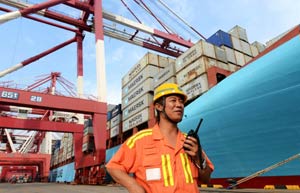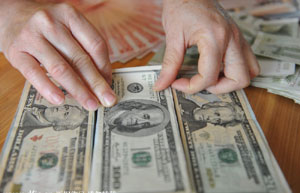The State Administration of Foreign Exchange on Thursday sought to allay worries about potential short-term capital flight, saying that the latest foreign exchange figures partly reflect increasing bank deposits in foreign currencies.
The August statistics showed that Chinese banks, for the first time in 13 months, sold more foreign currencies than they bought.
"There hasn't been any substantial change in China's capital inflows or outflows. The gap in the data exists in the form of growing foreign exchange deposits," said Guo Song, director of the capital account management department at the SAFE.
Foreign-currency deposits rose by $15.4 billion last month while loans dropped $3.3 billion, according to Guo.
"It means that companies and individuals are more willing to hold foreign currencies, which is a positive change indicating that the market outlook on the exchange rate has become more reasonable," he said.
In August, Chinese banks sold $147.4 billion in foreign currencies and bought $146.6 billion, yielding an $800 million deficit, according to the SAFE.
The regulator also emphasized taking a "prudent" approach toward the liberalization of the capital account, signaling no imminent or bold reforms in further opening the capital market.
But Guo said the SAFE will pursue the goal of gradually removing restrictions on the yuan's convertibility, creating greater convenience and giving the market more investment freedom.
China has reduced the number of items that require administrative approval from 59 to 20 under the capital account, according to the SAFE.
The agency is studying how to liberalize the rule that imposes a $50,000 ceiling on individuals' annual conversion of yuan to meet the growing demand for foreign currencies.
 |
 |
|
|
Top 10 most-used currencies in the world |
